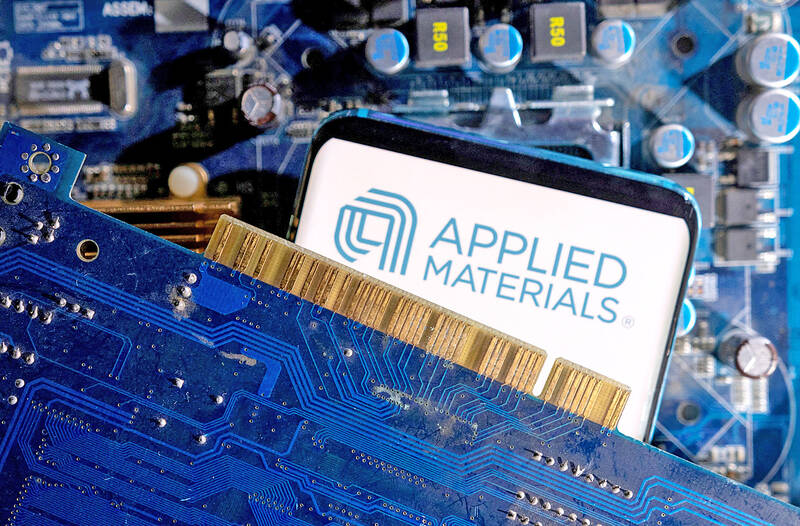Applied Materials Inc, the largest US maker of chip-manufacturing equipment, gave a lackluster forecast for the current period, highlighting the potential cost of the US trade dispute with China.
Sales would be about US$7.2 billion in the fiscal third quarter, plus or minus US$500 million, the company said in a statement on Thursday.
That was about in line with Wall Street estimates, although some analysts projected as much as US$7.4 billion. Profit would be about US$2.35 a share.

Photo: Reuters
Applied Materials and other chip-industry companies are adjusting to restrictions on sales to China, one of the biggest markets for their products.
The impact of tariffs imposed by Washington are also making it more difficult to project future revenue.
“There is more uncertainty in the market,” Applied Materials chief executive officer Gary Dickerson said in an interview.
“Despite that, the company is performing incredibly well,” he added.
Applied Materials shares fell more than 4 percent in extended trading following the announcement. They had earlier closed at US$174.75, leaving the stock up 7.5 percent for this year.
Applied Materials in February said rules adopted in the final months of former US president Joe Biden’s administration would knock about US$400 million off fiscal revenue for this year.
That is because Applied Materials would have to stop servicing equipment at some customer sites in China. However, technology export restrictions have continued to evolve under US President Donald Trump.
China accounted for 25 percent of Applied Materials sales previous quarter, down from 43 percent a year earlier.
Fiscal-second quarter profit was US$2.39 a share, excluding some items, compared with an analyst prediction estimate of US$2.31.
Revenue rose 7 percent to US$7.1 billion in the period, which ended on April 27, in line with estimates.
Demand remains strong for machines needed to make high-end processors for AI computing, but orders for less complex machinery used to make cars and industrial components have slowed, Dickerson said.
Applied Materials’ management has said that the industry is in a historic period of expansion. The rapid spread of semiconductors to new products and the AI boom would help maintain demand, Dickerson has said.
The sheer complexity of chips has also added pressure on customers to upgrade their equipment.
Applied Materials’ customer ranks include some of the biggest names in the chip industry, including Taiwan Semiconductor Manufacturing Co. (台積電) Samsung Electronics Co and Intel Corp.
Those manufacturers order gear well ahead of starting production, making Applied Materials’ forecasts a barometer for future demand.

Taiwan’s rapidly aging population is fueling a sharp increase in homes occupied solely by elderly people, a trend that is reshaping the nation’s housing market and social fabric, real-estate brokers said yesterday. About 850,000 residences were occupied by elderly people in the first quarter, including 655,000 that housed only one resident, the Ministry of the Interior said. The figures have nearly doubled from a decade earlier, Great Home Realty Co (大家房屋) said, as people aged 65 and older now make up 20.8 percent of the population. “The so-called silver tsunami represents more than just a demographic shift — it could fundamentally redefine the

Businesses across the global semiconductor supply chain are bracing themselves for disruptions from an escalating trade war, after China imposed curbs on rare earth mineral exports and the US responded with additional tariffs and restrictions on software sales to the Asian nation. China’s restrictions, the most targeted move yet to limit supplies of rare earth materials, represent the first major attempt by Beijing to exercise long-arm jurisdiction over foreign companies to target the semiconductor industry, threatening to stall the chips powering the artificial intelligence (AI) boom. They prompted US President Donald Trump on Friday to announce that he would impose an additional

China Airlines Ltd (CAL, 中華航空) said it expects peak season effects in the fourth quarter to continue to boost demand for passenger flights and cargo services, after reporting its second-highest-ever September sales on Monday. The carrier said it posted NT$15.88 billion (US$517 million) in consolidated sales last month, trailing only September last year’s NT$16.01 billion. Last month, CAL generated NT$8.77 billion from its passenger flights and NT$5.37 billion from cargo services, it said. In the first nine months of this year, the carrier posted NT$154.93 billion in cumulative sales, up 2.62 percent from a year earlier, marking the second-highest level for the January-September

Asian e-commerce giant Shein’s (希音) decision to set up shop in a historic Parisian department store has ruffled feathers in the fashion capital. Anger has been boiling since Shein announced last week that it would open its first permanent physical store next month at BHV Marais, an iconic building that has stood across from Paris City Hall since 1856. The move prompted some French brands to announce they would leave BHV Marais, but the department store had already been losing tenants over late payments. Aime cosmetics line cofounder Mathilde Lacombe, whose brand was among those that decided to leave following